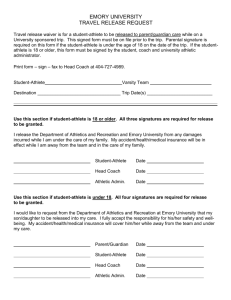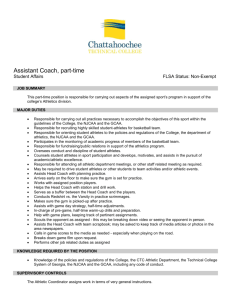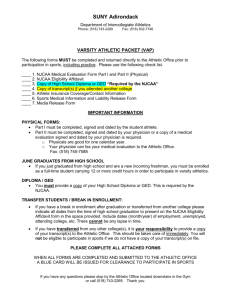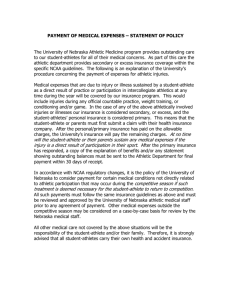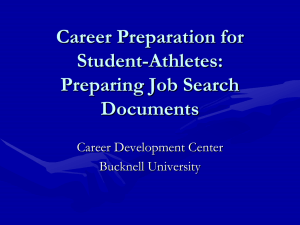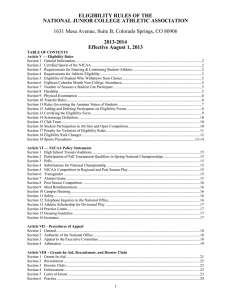Code of Conduct - Paradise Valley Community College
advertisement
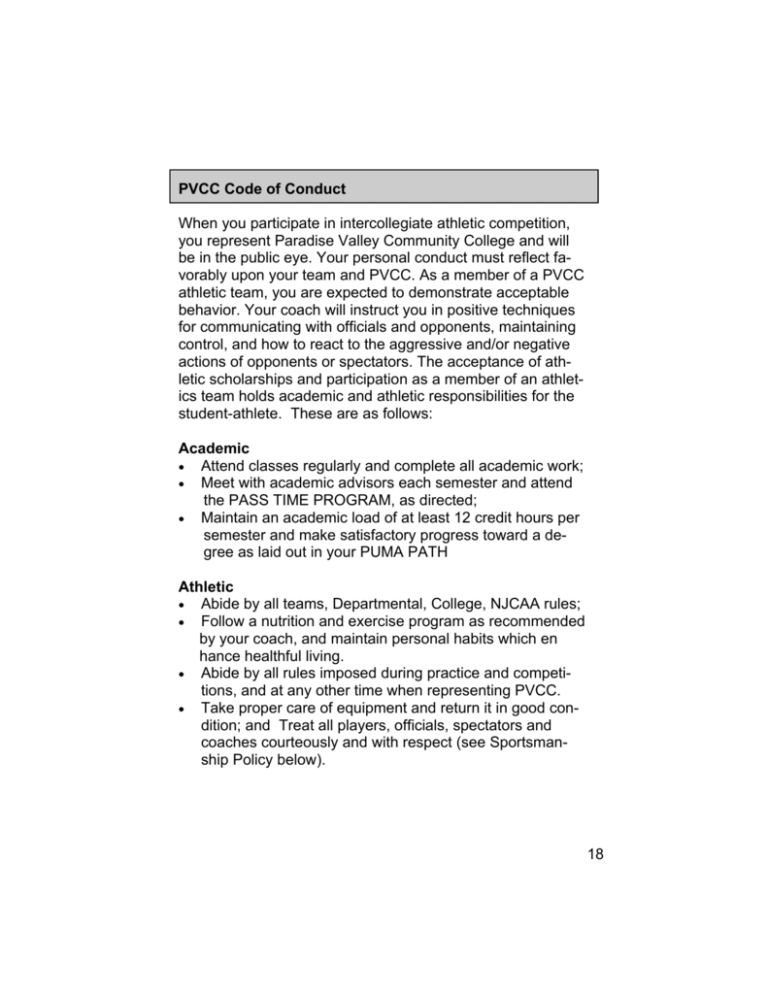
PVCC Code of Conduct When you participate in intercollegiate athletic competition, you represent Paradise Valley Community College and will be in the public eye. Your personal conduct must reflect favorably upon your team and PVCC. As a member of a PVCC athletic team, you are expected to demonstrate acceptable behavior. Your coach will instruct you in positive techniques for communicating with officials and opponents, maintaining control, and how to react to the aggressive and/or negative actions of opponents or spectators. The acceptance of athletic scholarships and participation as a member of an athletics team holds academic and athletic responsibilities for the student-athlete. These are as follows: Academic • Attend classes regularly and complete all academic work; • Meet with academic advisors each semester and attend the PASS TIME PROGRAM, as directed; • Maintain an academic load of at least 12 credit hours per semester and make satisfactory progress toward a degree as laid out in your PUMA PATH Athletic • Abide by all teams, Departmental, College, NJCAA rules; • Follow a nutrition and exercise program as recommended by your coach, and maintain personal habits which en hance healthful living. • Abide by all rules imposed during practice and competitions, and at any other time when representing PVCC. • Take proper care of equipment and return it in good condition; and Treat all players, officials, spectators and coaches courteously and with respect (see Sportsmanship Policy below). 18 General • When representing Athletics and PVCC, act in an appropriate manner in both behavior and dress. • Obey all federal, state and city laws; and • Do not use tobacco, alcohol and non-therapeutic drugs (see Tobacco, Alcohol/drugs Policy below) NJCAA Code of Conduct Sportsmanship: Certain standards of behavior are expected of all student-athletes and team personnel participating in any NJCAA event. Student-athletes are guests at any event; their participation is a privilege not a right. Sportsmanship and citizenship are modes of conduct that promote and develop respect for fellow participants, coaches, and teammates. That respect should also be reflected in the behavior of each student-athlete toward officials and spectators. Alcohol/Drugs: The use of all alcohol/drugs at any NJCAA sponsored event is prohibited. Any game official having reasonable cause to believe a student-athlete is using or is sufficiently impaired so as to endanger the individual or other individuals participating in said event by virtue of injury, use of alcohol, or drugs (including but not limited to performance enhancing or pain killing drugs) may remove or disqualify said individual from further participation in the sporting event. Tobacco: The use of all tobacco products shall be prohibited in all practices and athletic events conducted under the auspices of the NJCAA and member institutions. The event official shall immediately enforce event disqualification and/or additional penalties. 19 Code of Conduct—Social Networking While social networking websites are a popular way to communicate and connect with others, you need to be aware that the information and pictures you post (or others post about you) may have implications for your personal safety, personal and institutional image, NJCAA and Departmental code of conduct rules and future career/professional opportunities. Any actions which are deemed inappropriate and that compromise the image of the college, department, sport teams as well as behaviors which violate federal, state and local laws could result in discipline. Examples of inappropriate or offensive behaviors posted social networking websites may include depictions or presentations of the following: • Hazing • Use of alcohol and drugs • Lewd or lascivious behavior Information posted on social networking site is not private. Outside individuals can access this information and the information on an on-line profile can be used unintended ways including: • The parents of a prospective student-athlete could check the profiles of current athletes on the team to see what their son or daughter's future teammates are like. • A potential employer can review a student-athlete's profile before making a hiring decision. • Faculty, other college personal and law enforcement agencies can scrutinize a student-athlete's information. • Opposing spectators and players can obtain information regarding student-athletes which can then be used to taunt the athlete during a contest. 20 Code of Conduct Violation Penalties The Code of Conduct will be strictly enforced--warnings will NOT be given. Student-athletes are reminded that participation in athletics is a privilege and not a right. Additional disciplinary actions, above those stipulated by a game official, for any violation of the Code of Conduct will be assessed by the Athletic Director and may vary based on the type and severity of the violation. Penalties for violation of any part of the code may include: Event disqualification; Future game suspensions; Suspension and/or non-renewal of athletic scholarship; Permanent dismissal from the athletic program; and Criminal action Code of Conduct Reporting Obligation & Investigation Every student-athlete is obligated to report his or her violations of this Code of Conduct to his or her Head Coach or to the Director of Athletics within 24 hours of such violation. If the Department of Athletics becomes aware of an alleged violation of this Code of Conduct not reported by the studentathlete, the Director of Athletics or will take reasonable steps to verify the validity and accuracy of the report. These steps may include interviews of students and employees, or of noncollege persons having knowledge of relevant facts and the examination of documents. The Athletic Director will normally meet with the student-athlete prior to the imposition of discipline; however, in extenuating circumstances, the AD may suspend the student-athlete before the meeting. Sexual Harassment The policy of the Maricopa County Community College District (MCCCD) is to provide an educational, employment, and business environment free of unwelcome sexual advances, requests for sexual favors, and other verbal and/or physi21 conduct or communications constituting sexual harassment as defined and otherwise prohibited by state and federal law. Sexual harassment by and between, employees; students; employees and students; and campus visitors and students or employees, is prohibited by this policy. Violations of this policy may result in disciplinary action up to and including termination for employees; sanctions up to and including suspension or expulsion for students; and appropriate sanctions against campus visitors. It shall be a violation of MCCCD's Sexual Harassment Policy for any employee, student or campus visitor to: • • • • • Make unwelcome sexual advances to another employee, student or campus visitor; Make unwelcome requests for sexual favors, whether or not accompanied by promises or threats with regard to the employment or academic relationship; Engage in verbal or physical conduct of a sexual nature with another employee, student or campus visitor, that may threaten or insinuate, either explicitly or implicitly, that the individual's submission to, or rejection of, the sexual advances will in any way: (1) influence any personnel decision regarding that person's employment, evaluation, wages, advancement, assigned duties, shifts or any other condition of employment or career development; or(2) influence his or her grades, participation in or access to academic programs, class standing or other educational opportunities; Engage in verbal or physical conduct of a sexual nature that:(1) has the purpose or effect of substantially interfering with an employee's ability to do his or her job; or with a student's ability to learn or participate in a class; or (2) which creates an intimidating, hostile or offensive work or academic environment; Commit any act of sexual assault or public sexual 22 indecency against any employee or student whether on MCCCD property or in connection with any MCCCDsponsored activity; • Continue to express sexual interest in another employee, student or campus visitor after being informed or on notice that the interest is unwelcome (reciprocal attraction is not considered sexual harassment); Engage in other sexually harassing conduct in the workplace or academic environment, whether physical or verbal, including, but not limited to, commentary about an individual's body (or body parts), sexually degrading words to describe an individual, sexually offensive comments, sexually suggestive language or jokes, innuendoes, and sexually suggestive objects, books, magazines, computer software, photographs, cartoons or pictures. 23
